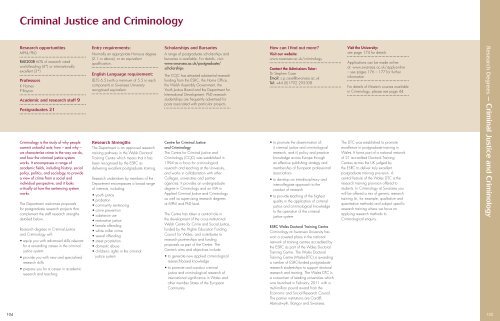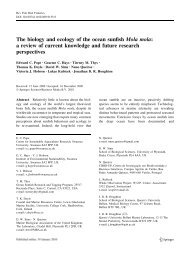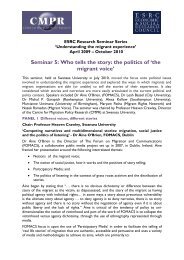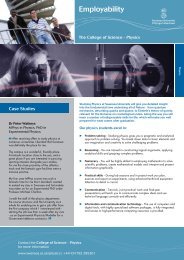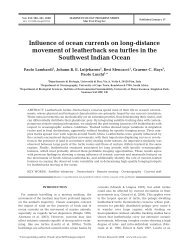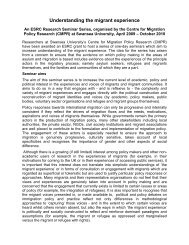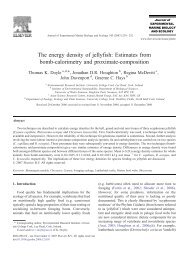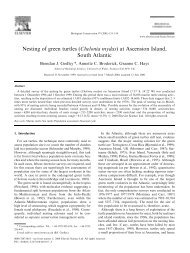Postgraduate Prospectus 2013 - Swansea University
Postgraduate Prospectus 2013 - Swansea University
Postgraduate Prospectus 2013 - Swansea University
You also want an ePaper? Increase the reach of your titles
YUMPU automatically turns print PDFs into web optimized ePapers that Google loves.
Criminal Justice and Criminology<br />
Research opportunities<br />
MPhil/PhD<br />
RAE2008 60% of research rated<br />
world-leading (4*) or internationally<br />
excellent (3*)<br />
Professors<br />
K Haines<br />
P Raynor<br />
Academic and research staff 9<br />
<strong>Postgraduate</strong>s 21<br />
Criminology is the study of why people<br />
commit unlawful acts; how – and why –<br />
we characterise crime in the way we do,<br />
and how the criminal justice system<br />
works. It encompasses a range of<br />
academic fields, including history, social<br />
policy, politics, and sociology, to provide<br />
a view of crime from a social and<br />
individual perspective, and it looks<br />
critically at how the sentencing system<br />
works.<br />
The Department welcomes proposals<br />
for postgraduate research projects that<br />
complement the staff research strengths<br />
detailed below.<br />
Research degrees in Criminal Justice<br />
and Criminology will:<br />
• equip you with advanced skills relevant<br />
for a rewarding career in the criminal<br />
justice system<br />
• provide you with new and specialised<br />
research skills<br />
• prepare you for a career in academic<br />
research and teaching<br />
Entry requirements:<br />
Normally an appropriate Honours degree<br />
(2.1 or above), or an equivalent<br />
qualification.<br />
English Language requirement:<br />
IELTS 6.5 (with a minimum of 5.5 in each<br />
component) or <strong>Swansea</strong> <strong>University</strong><br />
recognised equivalent.<br />
Research Strengths<br />
The Department is an approved research<br />
training pathway in the Welsh Doctoral<br />
Training Centre which means that it has<br />
been recognised by the ESRC as<br />
delivering excellent postgraduate training.<br />
Research undertaken by members of the<br />
Department encompasses a broad range<br />
of interests, including:<br />
• youth justice<br />
• probation<br />
• community sentencing<br />
• crime prevention<br />
• substance use<br />
• restorative justice<br />
• female offending<br />
• white collar crime<br />
• sexual offending<br />
• street prostitution<br />
• domestic abuse<br />
• children’s rights in the criminal<br />
justice system<br />
Scholarships and Bursaries<br />
A range of postgraduate scholarships and<br />
bursaries is available. For details, visit:<br />
www.swansea.ac.uk/postgraduate/<br />
scholarships<br />
The CCJC has attracted substantial research<br />
funding from the ESRC, the Home Office,<br />
the Welsh Assembly Government, the<br />
Youth Justice Board and the Department for<br />
International Development. PhD research<br />
studentships are frequently advertised for<br />
posts associated with particular projects.<br />
Centre for Criminal Justice<br />
and Criminology<br />
The Centre for Criminal Justice and<br />
Criminology (CCJC) was established in<br />
1994 as a focus for criminological<br />
research and teaching at the <strong>University</strong>,<br />
and works in collaboration with other<br />
Colleges, universities and partner<br />
agencies. It provides an undergraduate<br />
degree in Criminology and an MA in<br />
Applied Criminal Justice and Criminology<br />
as well as supervising research degrees<br />
at MPhil and PhD level.<br />
The Centre has taken a central role in<br />
the development of the cross-institutional<br />
Welsh Centre for Crime and Social Justice,<br />
funded by the Higher Education Funding<br />
Council for Wales, and contributes to<br />
research partnerships and funding<br />
proposals as part of the Centre. The<br />
Centre’s aims and objectives include:<br />
• to generate new applied criminological<br />
research-based knowledge<br />
• to promote and conduct criminal<br />
justice and criminological research of<br />
international significance in Wales and<br />
other member States of the European<br />
Community<br />
How can I find out more?<br />
Visit our website:<br />
www.swansea.ac.uk/criminology<br />
Contact the Admissions Tutor:<br />
Dr Stephen Case<br />
Email: s.p.case@swansea.ac.uk<br />
Tel: +44 (0)1792 295308<br />
• to promote the dissemination of:<br />
i) criminal justice and criminological<br />
research, and ii) policy and practice<br />
knowledge across Europe through<br />
an effective publishing strategy and<br />
membership of European professional<br />
associations<br />
• to develop an interdisciplinary and<br />
intercollegiate approach to the<br />
conduct of research<br />
• to provide teaching of the highest<br />
quality in the application of criminal<br />
justice and criminological knowledge<br />
to the operation of the criminal<br />
justice system<br />
ESRC Wales Doctoral Training Centre<br />
Criminology at <strong>Swansea</strong> <strong>University</strong> has<br />
won a coveted place in the national<br />
network of training centres accredited by<br />
the ESRC as part of the Wales Doctoral<br />
Training Centre. The Wales Doctoral<br />
Training Centre (Wales-DTC) is awarding<br />
a number of ESRC-funded postgraduate<br />
research studentships to support doctoral<br />
research and training. The Wales DTC is<br />
a consortium of leading universities which<br />
was launched in February 2011 with a<br />
multi-million pound award from the<br />
Economic and Social Research Council.<br />
The partner institutions are Cardiff,<br />
Aberystwyth, Bangor and <strong>Swansea</strong>.<br />
Visit the <strong>University</strong>:<br />
see page 174 for details<br />
Applications can be made online<br />
at: www.swansea.ac.uk/applyonline<br />
– see pages 176 – 177 for further<br />
information<br />
For details of Master’s courses available<br />
in Criminology, please see page 44.<br />
The DTC was established to promote<br />
excellence in postgraduate training in<br />
Wales. It forms part of a national network<br />
of 21 accredited Doctoral Training<br />
Centres across the UK judged by<br />
the ESRC to deliver truly excellent<br />
postgraduate training provision. A<br />
central feature of the Wales DTC is the<br />
research training provision offered to<br />
students. In Criminology at <strong>Swansea</strong> you<br />
will be offered a mix of generic research<br />
training (in, for example, qualitative and<br />
quantitative methods) and subject specific<br />
research training where we focus on<br />
applying research methods to<br />
Criminological enquiry.<br />
Research Degrees – Criminal Justice and Criminology<br />
104<br />
105


